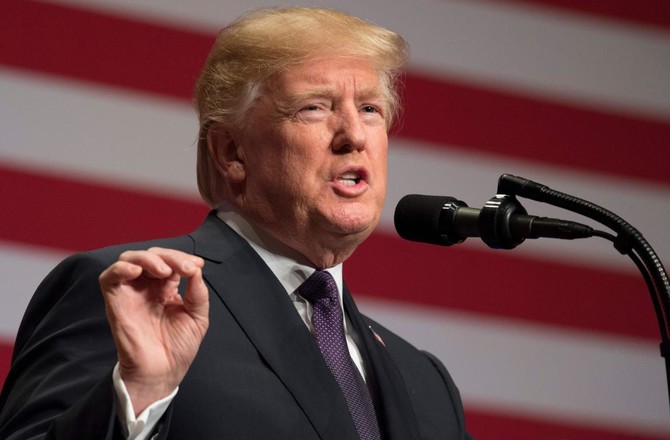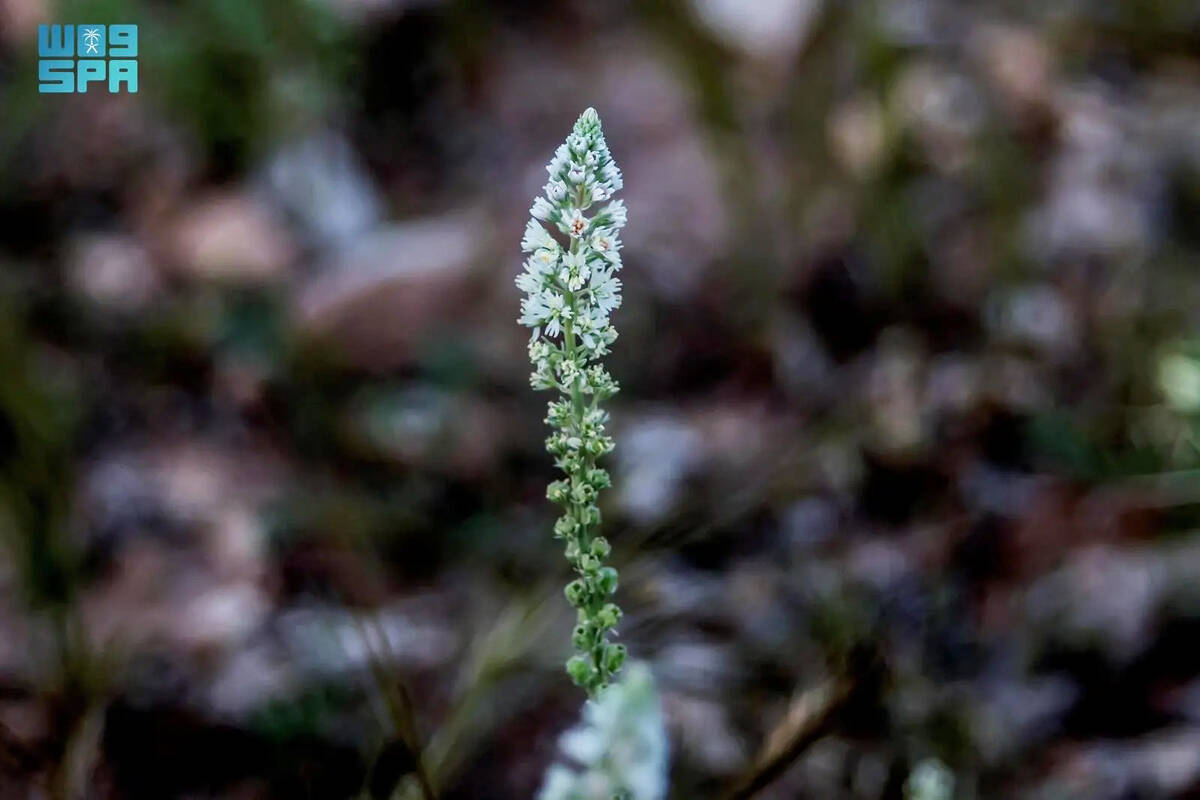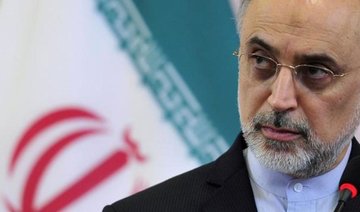WASHINGTON: President Donald Trump is expected this week to extend relief from economic sanctions to Iran as part of the nuclear deal, citing progress in amending US legislation that governs Washington’s participation in the landmark accord, according to US officials and others familiar with the administration’s deliberations.
But Trump is likely to pair his decision to renew the concessions to Tehran with new, targeted sanctions on Iranian businesses and people, the six people briefed on the matter said. The restrictions could hit some firms and individuals whose sanctions were scrapped under the 2015 nuclear agreement, a decision that could test Tehran’s willingness to abide by its side of the bargain.
The individuals — two administration officials, two congressional aides and two outside experts who consult with the government — weren’t authorized to speak publicly on the matter and demanded anonymity. They cautioned that Trump could still reject the recommendation from Secretary of State Rex Tillerson, Defense Secretary James Mattis and national security adviser H.R. McMaster and that no final decision had been made. They said heated discussions were going on within the administration and with key Republican lawmakers.
Trump must decide by Friday to extend the nuclear-related sanctions relief for Iran’s central bank or re-impose the restrictions that President Barack Obama suspended two years ago.
The old, central bank sanctions largely cut Iran out of the international financial system, and are considered to be the most powerful of the penalties imposed by the US during the Obama era, along with global penalties for buying Iranian oil. Some Iran hawks want to see both sets of restrictions return, but the six people with knowledge of Trump’s plans say the president isn’t planning to reinstate either at this point.
The individuals said Trump’s top national security aides appear to have successfully made a different case to the president: Waiving anew for 120 days the nuclear-linked sanctions while simultaneously imposing new measures to punish Iran’s ballistic missile testing, alleged terrorism support and human rights violations.
US to extend Iran sanctions relief: AP sources
US to extend Iran sanctions relief: AP sources

Pakistan’s textile industry looks to ‘grab business’ amid US-China tariff escalation

- Textile sector in Pakistan generates about $17 billion in exports and is the largest employer in the country
- Pakistan’s textile industry is expected to face potential losses of up to $2 billion in textile exports under new tariffs
ISLAMABAD: Pakistan’s textile sector is looking at opportunities to “grab business” as the US and China steadily hiked tariffs amid an escalating trade war, the head of the country’s textile council said this week.
The textile sector in Pakistan generates about $17 billion in exports and is the largest employer in the country, according to Fawad Anwar, Chairman of the Pakistan Textile Council.
“There is an opportunity to grab (business) from China. How well we can do that, that depends on how well we can sit on the table and negotiate,” said Anwar, who spoke to Reuters hours before US President Donald Trump temporarily paused hefty tariffs on dozens of countries for 90 days, except for China.
Pakistan would have been slapped with a 29 percent tariff rate before Trump’s turnabout on Wednesday. A 10 percent blanket duty on almost all US imports will remain in effect, the White House said.
Trump also hiked the tariff on Chinese imports to 125 percent from the 104 percent level that kicked in on Wednesday.
Previously, Beijing had slapped 84 percent tariffs on US imports to match an earlier tariff salvo from Trump and had vowed to “fight to the end” in an escalating tit-for-tat trade dispute between the world’s top two economies.
“This is a war between the two giants, and everything else is a collateral damage,” said Anwar.
Pakistan’s textile industry is expected to face significant challenges from the tariffs with potential losses of up to $2 billion in textile exports estimated by experts, if the 29 percent tariff rate is reinstated after Trump’s 90-day pause ends.
For Pakistan’s textile industry’s Anwar, the levy hike is a short term issue which ‘has to be resolved’.
“They cannot sustain this 29 percent, the US retailer or the US consumer… nobody can sustain this big of a percentage increase,” said Anwar.
Pakistan hopeful over success of June conference on settling Israel-Palestine conflict

- Commends France and Saudi Arabia for co-chairing preparatory consultations for June 2025 UN Conference
- Pakistan has for decades called for establishment of independent Palestinian state based on pre-1967 borders
ISLAMABAD: Pakistan has expressed hope over the success of a UN conference in New York in June on settling the Israeli-Palestinian conflict and implementing a two-state solution, the foreign office said on Thursday.
Pakistan, which does not recognize Israel, has for decades called for the establishment of an independent Palestinian state based on pre-1967 borders, with Al-Quds Al-Sharif as its capital.
“Pakistan reaffirms full support to the upcoming high-level international conference for the peaceful settlement of the Question of Palestine and the implementation of a two-state solution,” Foreign Office Spokesperson Shafqat Ali Khan said at a weekly media briefing.
“We commend France and the Kingdom of Saudi Arabia for co-chairing the preparatory consultations for the June 2025 Conference.”
Khan said Pakistan hoped the June Conference would restore hope in peace and justice through meaningful action.
“We believe that in the lead-up to the Conference: The ceasefire must be fully implemented; the blockade on Gaza must be lifted; humanitarian access must be guaranteed; civilians and humanitarian personnel must be protected. Any attempt to forcibly displace Palestinians or annex their land must be unequivocally rejected and effectively prevented.”
The statement came as French President Emmanuel Macron said on Wednesday France could recognize a Palestinian state at the upcoming UN conference, adding that in turn some countries in the Middle East could recognize the state of Israel.
The Palestinian Authority welcomed Macron’s statement as “a step in the right direction.”
Although nearly 150 countries have recognized Palestine statehood, most major Western powers including the United States, Britain, France, Germany and Japan, have not.
Muslim countries that do not recognize Israel include Saudi Arabia, Iran, Iraq, Syria and Yemen.
Reseda alba, an aromatic herb found across Saudi Arabia, plays vital role in fighting desertification

- Known by the common name white mignonette, reseda alba thrives in both sandy and clayey soils
- In springtime, the plant blooms, attracting bees and other pollinators, thereby enhancing ecological balance
ARAR: Reseda alba, a flowering aromatic herb, is naturally found in several regions of Saudi Arabia and is a key component of the local vegetation in the Northern Borders region.
Known by its common names white mignonette or white upright mignonette, the plant has small, white, fragrant flowers and is also cultivated as an ornamental plant. In springtime, reseda alba blooms, attracting bees and other pollinators, thereby enhancing ecological balance and supporting biodiversity.
Thriving in both sandy and clayey soils, the plant is well-suited to the desert climate of the Kingdom's Northern Borders region due to its drought-resistant nature. It also plays a vital role in combating desertification by stabilizing the soil.

A perennial plant that grows up to a meter tall, reseda alba is also native to Europe, Asia, and North Africa. It can also be found in other parts of the world as an introduced species.
Nasser Al-Mujlad, chair of the Aman Environmental Association, highlighted that the expansion of reseda alba is a key element of the region's natural botanical heritage, the Saudi Press Agency reported.
Al-Muilad pointed out that the plant's aesthetic appeal adds significant value to the region's tourism and environmental significance.
He further emphasized that many plants previously at risk of extinction have made a comeback, thanks to the establishment of reserves and the implementation of new regulations and laws aimed at protecting the environment and conserving its natural resources.
US Social Security lists thousands of living immigrants as dead to prompt them to leave, AP sources say

- The officials said stripping the immigrants of their Social Security numbers will cut them off from many financial services and encourage them to “self-deport”
WASHINGTON: The Trump administration has moved to classify more than 6,000 living immigrants as dead, canceling their Social Security numbers and effectively wiping out their ability to work or receive benefits in an effort to get them to leave the country, according to two people familiar with the situation.
The move will make it much harder for those affected to use banks or other basic services where Social Security numbers are required. It’s part of a broader effort by President Donald Trump to crack down on immigrants who were allowed to enter and remain temporarily in the United States under programs instituted by his predecessor, Joe Biden.
The Trump administration is moving the immigrants’ names and legally obtained Social Security numbers to a database that federal officials normally use to track the deceased, according to the two people familiar with the moves and their ramifications. They spoke on condition of anonymity Thursday night because the plans had not yet been publicly detailed.
The officials said stripping the immigrants of their Social Security numbers will cut them off from many financial services and encourage them to “self-deport” and abandon the US for their birth countries.
It wasn’t immediately clear how the 6,000-plus immigrants were chosen. But the Trump White House has targeted people in the country temporarily under Biden-era programs, including more than 900,000 immigrants who entered the US using that administration’s CBP One app.
On Monday, the Department of Homeland Security revoked the legal status of the immigrants who used that app. They had generally been allowed to remain in the US for two years with work authorization under presidential parole authority during the Biden era, but are now expected to self-deport.
Meanwhile, a federal judge said Thursday that she was stopping the Trump administration from ordering hundreds of thousands of Cubans, Haitians, Nicaraguans and Venezuelans with temporary legal status to leave the country later this month.
A representative from the Social Security Administration did not respond to a request for comment on the news that living immigrants were being classified as dead. The agency maintains the most complete federal database of individuals who have died, and the file contains more than 142 million records, which go back to 1899.
The Privacy Act allows the Social Security Administration to disclose information to law enforcement in limited circumstances, which includes when a violent crime has been committed or other criminal activity.
DHS and the Treasury Deprartment signed a deal this week that would allow the IRS to share immigrants’ tax data with Immigration and Customs Enforcement for the purpose of identifying and deporting people illegally in the US The agreement will allow ICE to submit names and addresses of immigrants inside the US illegally to the IRS for cross-verification against tax records.
The acting IRS commissioner, Melanie Krause, who had served in that capacity since February, stepped down over that deal.
In March, meanwhile, a federal judge temporarily blocked a team charged with cutting federal jobs and shrinking the government led by billionaire Elon Musk from Social Security systems that hold personal data on millions of Americans, calling their work there a “fishing expedition.”
Skye Perryman, president and CEO of Democracy Forward, an advocacy group that has challenged various Trump administration efforts in court, said her organization would likely sue over the Social Security numbers as well, once more details become available.
“This President continues to engage in lawless behavior, violating the law and abusing our systems of checks and balances,” Perryman said.
Rybakina leads Kazakhstan to a 2-1 win over Australia in BJK Cup

- Czech Republic beat Brazil 2-1 in Ostrava in Group B, while the Netherlands cruised past Germany 3-0 in The Hague in Group F
- Poland, without French Open champion Iga Swiatek after the world No. 2 opted out of the tournament to focus on her training ahead of the clay season, beat Switzerland 3-0 in Radom
BRISBANE: Elena Rybakina showcased her prowess to beat Kimberly Birrell 6-3 7-6(4) as Kazakhstan secured a 2-1 win over Australia in their Billie Jean King Cup Group D qualifier in Brisbane on Thursday.
Rybakina, the 2022 Wimbledon champion, went down an early break but cranked up her powerful forehand and drew level after six games before claiming the opening set with an ace.
Birrell raced to a 5-1 lead in the second set but squandered a set point and Rybakina clawed her way back with some ferocious shot-making to clinch victory in the tiebreak.
“It was such a difficult match,” said Rybakina, who secured her eighth victory in 10 singles matches since her debut in the competition in 2021.
“I’m super happy to bring the win for the team ... it’s always nice to be back in Australia.”
Earlier at the Pat Rafter Arena, Yulia Putintseva gave Kazakhstan an early lead with a 6-2 6-1 win over debutant Maya Joint.
However, Australia’s Storm Hunter and Ellen Perez claimed the third match of the night with a 6-3 6-4 victory over Anna Danilina and Zhibek Kulambayeva in the doubles.
Czech Republic beat Brazil 2-1 in Ostrava in Group B, while the Netherlands cruised past Germany 3-0 in The Hague in Group F.
Poland, without French Open champion Iga Swiatek after the world No. 2 opted to skip their Group E ties to focus on her training ahead of the clay season, beat Switzerland 3-0 in Radom.
Jessica Pegula and Danielle Collins were among a trio of players to withdraw from the US team, which plays Denmark on Saturday in Group C, for the three-day qualifiers.
Teams have been divided into six round-robin groups of three in the qualifiers this year with the winners joining hosts China and 2024 champions Italy at the Finals in Shenzhen toward the end of the season.




















